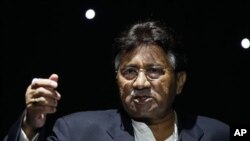Pakistan's former President Pervez Musharraf says the United States should share the blame for allowing Taliban rebels and al-Qaida leaders from Afghanistan to find sanctuary in his country. Mr. Musharraf made the comments at the Council on Foreign Relations in New York on Tuesday.
Mr. Musharraf told council members that he does not know whether al-Qaida leader Osama bin Laden is among those hiding in the northwest regions of his country. The former Pakistani president said it is an undeveloped region with rugged mountains, poor communication, low literacy and a culture in which people protect guests. He said there is public sympathy in the region for al-Qaida, dating to the days when many of its members fought against the Soviet Union's invasion of Afghanistan during the 1980s.
Mr. Musharraf questioned why Pakistan typically is cited for not finding the rebels.
"Pakistan is trying its best," said Musharraf. "Why is the responsibility only on Pakistan? Why is the responsibility of their coming into Pakistan not the fault of Afghan forces and U.S. forces and coalition forces? It should be shared at least 50-50. We are at fault; you are also at fault."
Mr. Musharraf criticized the use of what are widely believed to be U.S. drones to attack rebel strongholds in northwestern Pakistan.
"Give the drones to Pakistan," he added. "Why don't you give them to us? We'll use them. So this issue of violation of Pakistani sovereignty will not be there. But then you have your own problems of security of transfer of technology, high technology. Well, this is the situation."
The former Pakistani leader accused neighboring India of seeking "to create an anti-Pakistan Afghanistan." Mr. Musharraf charged that Indian consulates in Kandahar and Jalalabad have no role, except to create trouble for Pakistan.
Mr. Musharraf expressed concern about the Obama administration's timetable for withdrawing troops from Afghanistan next year. He said he doubts whether the security situation in Afghanistan will be stable enough by mid-year for U.S. forces to begin withdrawing.
Among those in the audience at the Council on Foreign Relations was Nicholas Platt, who served as U.S. Ambassador to Pakistan during the early 1990s. He says the timetable for a U.S, military withdrawal might pit American domestic politics against conditions in South Asia.
"I think the actual setting of the deadline may have been comforting to certain elements of the American body politic, sent shivers through many spines in South Asia," noted Platt.
Mr. Musharraf says he recognizes the risks in staying involved in politics in Pakistan, but says if he doesn't try there is little chance for an improvement in the situation there.




